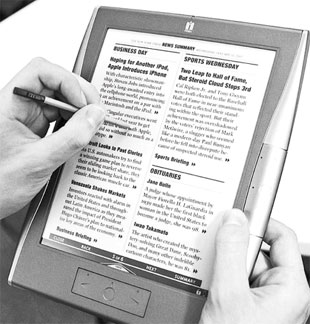Reading books sans leaves
 Can you make omelettes without eggs or read books without leaves?
Maybe a few years ago we could have answered both questions with a
definite ‘No’. Even today we cannot make omelettes without eggs, but we
can read books sans leaves. An e-book or electronic book is a
technological marvel and we cannot even imagine what will surprise us in
the future. Can you make omelettes without eggs or read books without leaves?
Maybe a few years ago we could have answered both questions with a
definite ‘No’. Even today we cannot make omelettes without eggs, but we
can read books sans leaves. An e-book or electronic book is a
technological marvel and we cannot even imagine what will surprise us in
the future.
Also written as “eBook” or “ebook”, an electronic book is an e-text
that forms the digital media equivalent of a conventional printed book.
We usually read e-books on personal computers or smart phones. There are
also special hardware known as “e-book readers” or “e-book devices”
which help us to read e-books. Today it is not surprising to download an
e-book to your mobile phone and read it at leisure. e-books have
revolutionised the reading habit that has its roots in the distant past.
Before printing was introduced, people used to read writings on clay
slabs or stones. Later people used papyrus, ola leaves and then paper to
write their thoughts. We have a treasure trove of religious books
written on ola leaves and preserved in Buddhist temples. They were
written manually with care and dedication.
Source of knowledge
With the introduction of the printing press, books became a cheaper
source of knowledge. In fact, if not for the printed books, education
would not have spread far and wide. Parents and teachers always
encouraged children to read books to widen their knowledge. Gradually,
people began to collect books and put up libraries. In addition to
public libraries, there are many private libraries with large
collections of books on diverse subjects.
 |
|
e-books have
revolutionised the reading habit |
When the people are quite comfortable with printed books, the entry
of e-books would have taken them by surprise. Of course, the early
e-books were generally written for limited audiences. They were
primarily meant to be read by small groups because the scope of the
subject matter was technology and science. However, in the course of
time, e-books proliferated into other subject areas, making a dramatic
impact on the reading public. Major software companies diversified the
e-book market to embrace a wider readership.
When publishers began to distribute e-books on various other subjects
including novels and short stories, a mini revolution began in the world
of reading. Many authors whose books had not been accepted by reputed
publishers offered their work online.
Internet
Sometimes, catalogues of books were made available over the internet
and sites devoted to e-books began disseminating information about them.
While this was happening, some books were made available as e-books and
in the printed format.
Today the e-book market has come to stay. Some publishers produce
only the electronic version of their books. If there is a demand for the
printed version, it is done on demand. However, books are traditionally
printed and published. The electronic version is produced at the
discretion of the author. A few local authors too have published
e-books, but the local electronic book industry is still in its infancy.
e-books have their advantages and disadvantages. For instance, a single
e-book reader containing several books is easier to carry than several
printed books. Unlike in printed books, the font size and font face can
be adjusted to suit the reader. This is a great advantage for elderly
readers or those with vision problems. Unlike printed books, e-books
allow animated images or multimedia clips to be embedded in the book. On
the other hand, although e-book readers are costly, the electronic texts
are generally cheap.
Raw material
The biggest advantage of e-books is that it does not consume paper
and ink. For instance, a printed book uses three times more raw material
and 78 times more water to produce it.
One disadvantage of e-books is that electronic devices and software
are expensive. e-book readers also need electrical power. Readers need
battery power when they are on the move. As with many other
technological devices, e-book readers can malfunction at any time due to
faults in hardware or software. On the other hand, if an e-book is lost
or stolen, the cost of replacement can be prohibitive.
Some people find it difficult to read e-books because it causes eye
strain. Unlike a printed book, an e-book is not safe from
electromagnetic pulses and overloads. What is more, a printed book may
last a lifetime, but an e-book may need constant repairs and
maintenance.
At least for the older generation, a printed book with its attractive
cover, the smell of paper and ink and the sense of belonging cannot be
replaced with an e-book.
|

